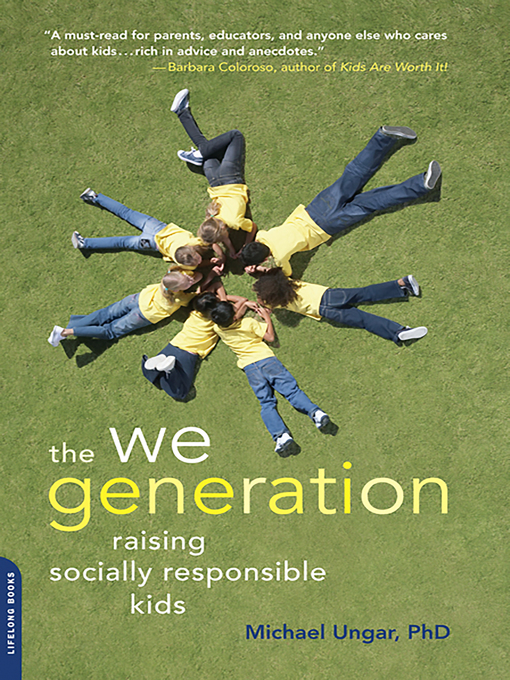- New eBook additions
- All About Education
- Cozy ebooks for Fall
- Made in West Virginia
- A Shore Thing
- First in the series
- Strange New Worlds
- Worlds of Fantasy
- Most popular
- Available now
- Try something different
- Just Plain Good
- See all ebooks collections
-
Creators
-
Publisher
-
Release date
October 6, 2009 -
Formats
-
Kindle Book
-
OverDrive Read
- ISBN: 9780786746002
-
EPUB ebook
- ISBN: 9780786746002
- File size: 295 KB
-
-
Languages
- English
-
Reviews
-
Publisher's Weekly
November 2, 2009
Can the “Me Generation” of baby boomers raise a “We Generation” of consciously compassionate, less self-involved kids? Canadian psychologist Ungar believes so and has written this guide for parents to help them foster in their offspring a spirit of volunteerism, a willingness to “give back” and a directive to do well by doing good. Each of these eight, action-oriented chapters offers anecdotes, self-evaluation tools, lists of activities and boxed tips as it addresses part of a plan for overcoming the problem of self-centered kids, starting with recognizing and learning that kids want to help and make changes; that compassion leads to connection, which leads to responsibility; how grandparents, neighbors and other parents can join forces; why parent-child affection is so important; how to guide kids spiritually and emotionally; how to avoid kids' isolation and anonymity in society; and strategies for generating excitement about being part of a wider world. Critical to all this is parents' commitment to model what they want to see in their kids. While this book may raise more questions than it answers—can kids who do community service only for college application profiles grow a conscience? or what about rebellious kids who do the opposite of their parents?—it is timely. Just as cardigan-clad Mr. Rogers embodied this concept in his PBS neighborhood, Ungar reframes it for today's families. -
Library Journal
October 19, 2009
Modern culture has led to a generation of parents hyperfocused on individualism, argues Ungar (social work, Dalhousie Univ.). Kids, however, haven't changed in their desire for compassionate communication, and he pleads with parents to envision a "We" generation of socially responsible kids who have a sense of collective responsibility. Despite the technological tools that make for constant communication, it is the feeling of belonging to something larger than oneself-a child's understanding that he is part of a family and community that values him-that lays the roots for responsible compassion. In chapters analyzing various types of connections-family, spiritual, physical, architectural-Ungar concludes each chapter with a "tips list" for ways to nurture kind connections. This pairs nicely with two other recent standouts: Kim John Payne's Simplicity Parenting and Polly Young-Eisendrath's The Self-Esteem Trap.-Julianne J. Smith, Ypsilanti Dist. Lib., MICopyright 2009 Library Journal, LLC Used with permission.
-
Formats
- Kindle Book
- OverDrive Read
- EPUB ebook
subjects
Languages
- English
Loading
Why is availability limited?
×Availability can change throughout the month based on the library's budget. You can still place a hold on the title, and your hold will be automatically filled as soon as the title is available again.
The Kindle Book format for this title is not supported on:
×Read-along ebook
×The OverDrive Read format of this ebook has professional narration that plays while you read in your browser. Learn more here.


